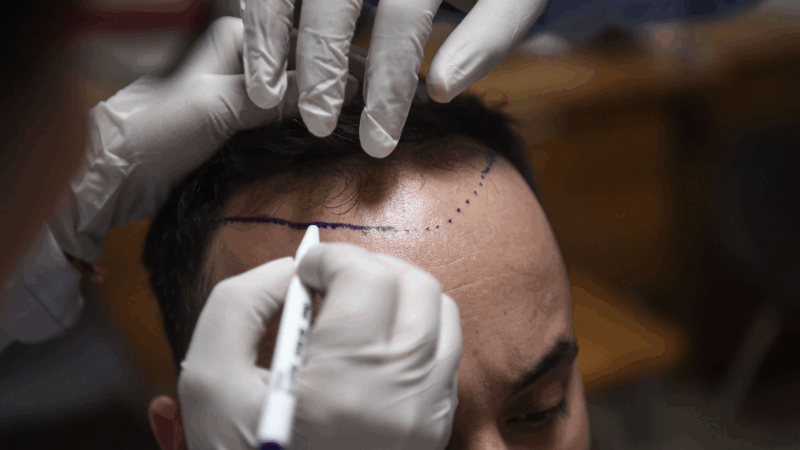How one country has become a top destination for hair transplants
ISTANBUL — In a bright clinic on the eastern side of Istanbul, a man leans over another man’s scalp.
There’s a marker in his hand, and he’s drawing thin, careful lines across the cranium. It looks almost like an art class. Except the canvas here is a human head.
Dr. Mehmet Erdogan (no relation to Turkey’s president) runs the Smile Hair Clinic in Istanbul, a sleek multistory complex that boasts a 90-95% hair transplant success rate. Since it opened in 2018, the clinic has been treating around 500 patients every year. Most come from abroad: around a third come from the United States alone.
“OK, I will draw according to what I recommend to you,” Erdogan says, as the pen squeaks against the scalp of his patient, Justin R., a registered nurse from California. Justin, in his early 40s, didn’t want NPR to use his last name so that he could discuss a private health care issue.
Hair transplants aren’t new — but suddenly, they’re everywhere. And Turkey has become the industry’s unofficial capital.
The country now draws patients from across the globe, lured by lower costs, bundled travel packages, and a growing network of clinics. The result has been a booming new industry, with significant economic gain. But although the procedure is generally considered safe when carried out by a skilled surgeon, the industry’s success has prompted concerns about possible risks and oversight.
For Justin, the decision came down to dollars.
He told NPR his transplant, including airfare and lodging, cost him about $3,400. He was given quotes for more than double that at clinics he reached out to in California.
In the U.S., the average price for comparable procedures runs upwards of $13,000, according to a 2023 study published by the American Society of Plastic Surgeons.
Turkey has built an entire industry on that kind of cost gap.
According to the Turkish Health Tourism Association, around 1 million people traveled to the country in 2022 for hair transplants alone, spending about $2 billion.
Nationwide, health tourism brought in even more: about 2 million medical tourists in 2024, generating close to $3 billion, according to data from the Turkish Health Ministry.
Walk through Istanbul’s airports and you’ll see the ads — smiling men with fresh hairlines, clinics promising all-inclusive packages with hotels, airport transfers, translators, even sightseeing.
The hidden risks
Not every story ends with a perfect hairline.
The International Society of Hair Restoration Surgery has flagged concerns about so-called “black market clinics,” where unlicensed practitioners perform delicate procedures or rush through multiple patients a day. The medical association says it has received reports of outcomes ranging from botched hairlines to infections and scarring.
Glen Jankowski, a psychologist at University College Dublin and author of forthcoming book Branding Baldness, warns there are also medical risks that go beyond the physical results.
“It’s really important that, especially the hair follicles, you aren’t doing too much harvesting in one session,” he explains. “It does have an effect on your blood pressure. It really is important that medically trained people are doing it — and sometimes that’s not the case.”
Jankowski also says that patients are sometimes pushed onto medications like minoxidil or finasteride without full consent. “Those drugs can have significant side effects,” he says. “You should only take them with proper medical advice and informed consent.”
The Turkish Health Ministry has pledged stricter oversight and more inspections. Still, critics say the sheer number of clinics — some estimates put it at 5,000 in Istanbul alone — makes enforcement difficult.
The social media effect
So why do so many men sign up? It’s not just the savings. Or the vanity.
It’s psychology — and TikTok.
“Most people worry about hair loss regardless of their actual hair count, because the advertising is so strong around it,” says Jankowski.
At the Smile Hair Clinic, the waiting room tells this very story. A giant screen loops TikTok and Instagram reels from happy clients, swiping their hands over fresh hairlines. “Five months ago I flew to Istanbul,” one man boasts. “Best decision ever.”
Social media has turned the transplant into a lifestyle upgrade. It’s a makeover to flaunt, not hide. And the more men show off their results, the more normal the surgery feels.
A few months after his operation, NPR checked in with Justin R. He says he feels younger, more confident — and grateful he didn’t have to spend twice as much back home.
Doctors like Erdogan say most patients feel the same. But he also admits the rush of clinics and customers has created a “Wild West” atmosphere, where it’s up to patients to do their homework.
Of course, not everyone signs up.
Jankowski, the psychologist, has chosen another route.
“The hair we carry on top of our heads, we think it’s really meaningful. It’s not,” he says. “[My hair] doesn’t clog my shower anymore. It doesn’t fall into my porridge. There’s a beauty and wisdom to [hair loss] we’re unfortunately losing.”
For some, that’s the safer and cheapest choice of all — shave it off and move on.
How IVF has led to a record number of single moms in their 40s
Who gets to be a parent has been reshaped by IVF: Single women in their 40s are increasingly opting to become moms.
Exercise is as effective as medication in treating depression, study finds
New research shows exercise is as effective as medication at reducing symptoms of depression. And you don't need to run a marathon to see benefits. So how much is enough?
Marrying for health insurance? The ACA cost crisis forces some drastic choices
While Congress debates bringing back Affordable Care Act subsidies , many Americans have already made life-altering decisions to afford health care.
Celebrities wear pins protesting ICE at the Golden Globes
Some celebrities donned anti-ICE pins at the Golden Globes on Sunday in tribute to Renee Good, who was shot and killed by an Immigration and Customs Enforcement officer last week in Minneapolis.
Malaysia, Indonesia become first to block Musk’s Grok over AI deepfakes
Malaysia and Indonesia have become the first countries to block Grok, the artificial intelligence chatbot developed by Elon Musk's xAI, after authorities said it was being misused to generate sexually explicit and non-consensual images.
Death toll from protests in Iran increases as Trump says Iran wants to talk
President Trump said Sunday that Iran proposed negotiations after his threat to strike the Islamic Republic over its crackdown targeting demonstrators. Activists say at least 544 have died.








